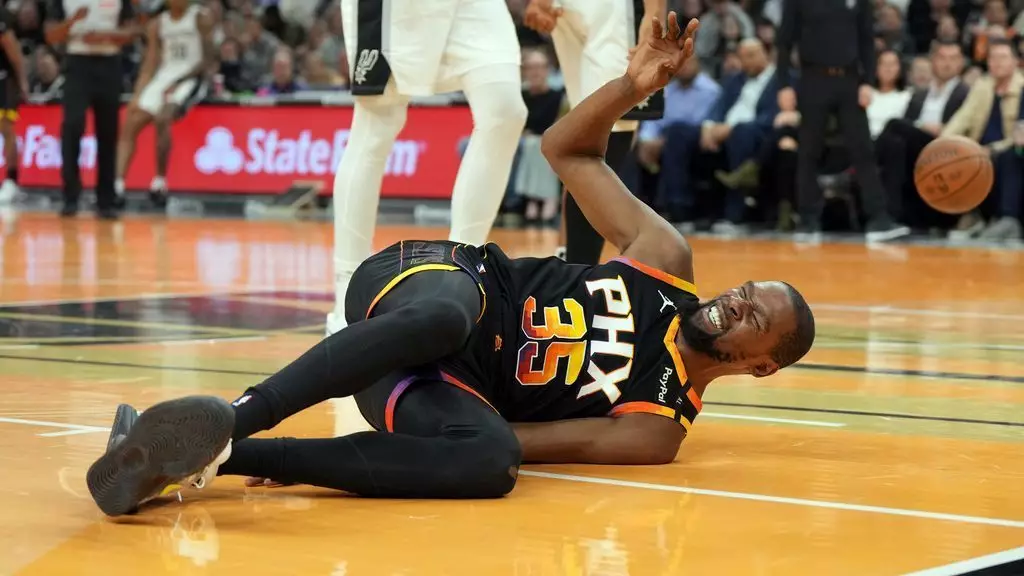Kevin Durant, the Phoenix Suns’ superstar forward, left the court just before halftime in a recent game against the San Antonio Spurs after suffering a sprained left ankle. This moment not only marked a critical juncture in the game, which the Suns won 104-93, but also raised concerns about the larger implications for a team that has struggled with injuries. Coach Mike Budenholzer revealed that the medical staff would reassess Durant’s condition on the following morning, creating an atmosphere of uncertainty regarding the team’s lineup and future strategies.
During a fast-paced transition play at the end of the second quarter, Durant found himself in a precarious situation. Attempting to navigate between Spurs defenders Julian Champagnie and Devin Vassell, he inadvertently stepped on Champagnie’s foot, leading to a concerning fall. The incident left Durant flat on his back, clutching his ankle in distress. Despite this, he demonstrated remarkable resilience by hitting two free throws immediately following the injury. However, his subsequent performance was cut short when he was replaced shortly thereafter, raising fears among Suns fans and coaching staff alike.
Budenholzer acknowledged the broader challenges of navigating an injury-riddled season. “It’s part of our league,” he commented, highlighting that no team is immune to the trials brought on by injuries and absences. His words underline a crucial truth about professional sports: adaptability is essential. While the loss of a star player like Durant can be devastating, it also opens up opportunities for other players to step up and showcase their talent.
Suns players seem to embody this spirit of resilience. After Durant’s exit, Grayson Allen took to the court, stepping into a role left vacant by the injured star. The mentality of “next man up” is vital for a team facing the unpredictable nature of an NBA season. As teammate Bradley Beal remarked, it’s essential to focus on the positives and embrace the depth the Suns possess. “We have plenty of depth to get it done,” he asserted, emphasizing the upsurge of opportunities available for other players to shine.
Kevin Durant’s injury record is an unsettling topic for both fans and analysts. Having already missed seven games due to a right calf injury earlier this season, his recent sprained ankle raises red flags about his durability as the season progresses. Notably, the Suns have recorded a dismal 1-6 when Durant is sidelined, highlighting his immense value to the team’s overall performance. Before this setback, however, the Suns boasted an impressive 10-2 record in games featuring Durant, illustrating how instrumental he is to their success.
Durant, a 14-time NBA All-Star, carries the weight of expectations not only for his scoring ability but also for his leadership and experience on the court. His ability to return from injuries has been closely monitored by fans, all too aware of how critical he is to the team’s championship aspirations. His absence, even for a short duration, can have severe repercussions for a Suns team that has invested heavily in mentoring its roster around Durant’s elite skill set.
Despite the cloud of injury lurking over the team, there were noteworthy performances in the game against the Spurs. Devin Booker, a foundational player for the Suns, reached a significant milestone by scoring his 15,000th career point just moments into the game. Finishing with a remarkable 29 points, he joined a select group of players in franchise history to reach this threshold, showcasing the talent and determination within the squad. Booker’s achievement is a reminder that while injuries can alter a game plan, individual brilliance can shine through and inspire a team.
As Booker acknowledged, every team faces adversities during the season; it’s how they respond to these challenges that defines their character. This ordinary yet crucial moment for him encapsulates the essence of teamwork and resilience, even in the face of adversity. The Suns now have an opportunity to forge ahead, diversifying their strategies and building in-depth experience, which could prove beneficial as they aim for playoff contention later in the year.
As the Suns look towards the future, it remains to be seen how Durant’s injury will influence their trajectory. With a schedule that presents both challenges and opportunities, the Suns may have to make adjustments, both in player rotations and overall strategy. Balancing the need to cope with Durant’s absence while maximizing their depth will be a finely tuned dance for Coach Budenholzer.
Ultimately, the Suns’ ability to navigate this challenging phase will solely depend on their collective resilience and the emergence of new leaders within the team. While the immediate concern is Durant’s health, the long-term outlook hinges on how they adapt and respond in the face of adversity. Through it all, the Suns must continue searching for ways to thrive, embracing both the struggles and the triumphs along their journey.

